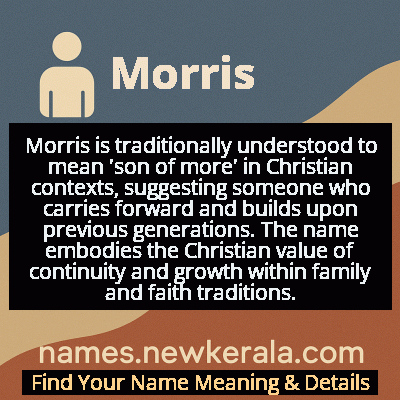Morris Name Meaning & Details
Origin, Popularity, Numerology Analysis & Name Meaning of Morris
Discover the origin, meaning, and cultural significance of the name MORRIS. Delve into its historical roots and explore the lasting impact it has had on communities and traditions.
Name
Morris
Gender
Male
Origin
Christian
Lucky Number
2
Meaning of the Name - Morris
Morris is traditionally understood to mean 'son of more' in Christian contexts, suggesting someone who carries forward and builds upon previous generations. The name embodies the Christian value of continuity and growth within family and faith traditions.
Morris - Complete Numerology Analysis
Your Numerology Number
Based on Pythagorean Numerology System
Ruling Planet
Moon
Positive Nature
Diplomatic, friendly, artistic, empathetic.
Negative Traits
Over-sensitive, moody, indecisive, prone to self-pity.
Lucky Colours
Green, cream, white.
Lucky Days
Monday.
Lucky Stones
Pearl, moonstone.
Harmony Numbers
1, 3, 4.
Best Suited Professions
Diplomats, mediators, caregivers, artists.
What People Like About You
Cooperative spirit, friendliness, artistic talent.
Famous People Named Morris
Morris Chestnut
Actor
Known for roles in films like 'Boyz n the Hood' and 'The Best Man' franchise
William Morris
Textile Designer, Poet
Founder of the Arts and Crafts Movement and influential designer
Morsey
Philanthropist, Businessman
Co-founder of Macy's department store and major philanthropist
Morris Day
Musician
Lead singer of The Time and prominent figure in Minneapolis sound
Name Variations & International Equivalents
Click on blue names to explore their detailed meanings. Gray names with will be available soon.
Cultural & Historical Significance
The name's journey through different cultures demonstrates its adaptability and enduring appeal. From early Christian martyrs to Jewish immigrants seeking to maintain cultural identity while assimilating, to its establishment as a solid, traditional name in American naming practices, Morris has maintained its position as a name that bridges cultural divides. Its consistent use across centuries speaks to its timeless quality and the positive associations it carries in multiple cultural frameworks.
Extended Personality Analysis
Individuals named Morris are often perceived as reliable, practical, and grounded. They tend to exhibit strong traditional values and a methodical approach to life's challenges. Many Morrises are known for their loyalty and steadfastness in relationships, making them dependable friends and partners. There's often an undercurrent of creativity and artistic sensibility associated with the name, possibly influenced by famous bearers like William Morris. They typically value stability and security, yet possess the wisdom to adapt when necessary.
Morrises are frequently seen as the 'rock' in their social circles—people who others turn to for sound advice and support during difficult times. Their combination of practicality and depth makes them excellent problem-solvers who approach situations with both logic and compassion. While they may not seek the spotlight, they often become respected leaders in their communities through consistent action and integrity. The name suggests someone who builds lasting foundations rather than chasing temporary trends, embodying the virtues of patience, perseverance, and quiet strength that serve well in both personal and professional contexts.
Modern Usage & Popularity
In contemporary naming practices, Morris occupies an interesting position as a vintage name that hasn't yet experienced the full-scale revival seen with other classic names. While it peaked in popularity during the late 19th and early 20th centuries, it has seen a decline in recent decades. According to Social Security Administration data, Morris ranked around 800th in popularity for boy names in the United States in recent years. However, the name is experiencing a mild resurgence as part of the vintage name revival trend, particularly among parents seeking classic, strong-sounding names with historical depth. It maintains stronger usage in certain regional and cultural communities, including Jewish and African American families where it has traditional significance. The name continues to be used more frequently as a middle name than a first name in modern naming practices, serving as an honorific that connects new generations to family heritage.
Symbolic & Spiritual Meanings
Symbolically, Morris represents endurance, tradition, and grounded wisdom. The name carries connotations of reliability and steadfastness, much like the oak tree in nature—firmly rooted yet adaptable. It symbolizes the bridge between old and new, carrying historical weight while remaining functional in modern contexts. The name also embodies the concept of 'the rock'—someone who provides stability and support to others. In metaphorical terms, Morris suggests depth beneath a practical exterior, representing the idea that true strength often lies in quiet consistency rather than flashy displays. The name's connection to both Christian martyrdom and Jewish tradition gives it symbolic weight as a name that has weathered cultural shifts while maintaining its core identity across generations and communities. It represents the enduring quality of traditional values in a changing world and the quiet dignity that comes from knowing one's place in a larger historical narrative.

